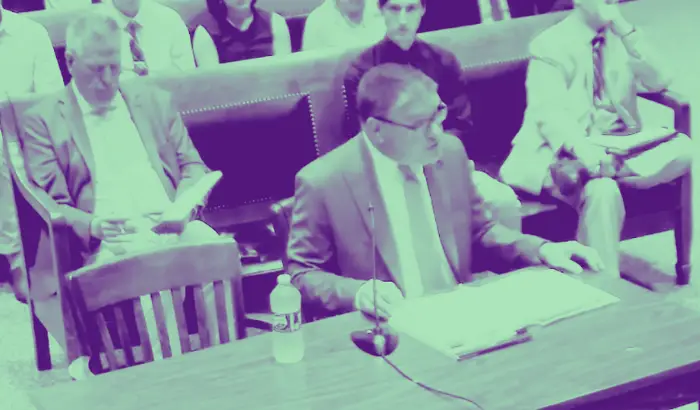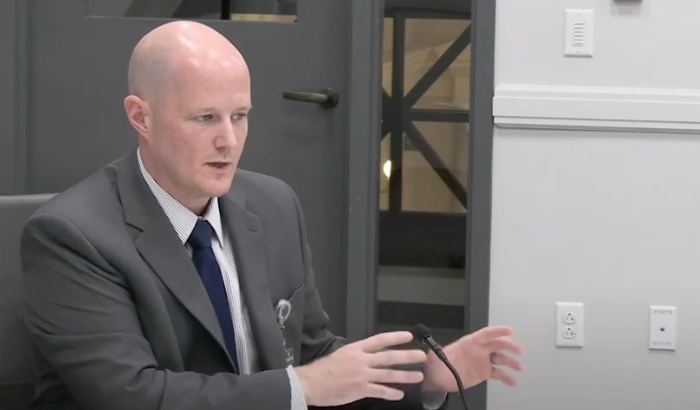
In testimony to joint cannabis committee, IG Jeffrey Shapiro explains reasons for proposed agency takeover, lays out potential path to receivership through legislature
The following testimony was delivered by Massachusetts Inspector General Jeffrey S. Shapiro to members of the Committee on Cannabis Policy during an informational hearing on July 9, 2024 regarding the “Need for a Receiver to be Appointed to Stabilize the Cannabis Control Commission.” -TJM Editors
Chairman Donahue, Vice Chair Consalvo, Ranking Member Representative Berthiaume, and House Members of the Committee:
Good day. Chairman Donahue, thank you for your leadership in convening this hearing, on short notice, late in the formal session, based, in part, on my letter of June 18, 2024. In that letter, I recommended that the Legislature take immediate action to provide clarity and direction for the daily operations of the Cannabis Control Commission to help protect this emerging industry by creating a mechanism for the appointment of a receiver to manage the day-to-day operations of the Commission.
Today I would like to address (1) why I made this recommendation; (2) why I made it now; and (3) what next steps look like. I’ll give you a brief overview and then discuss each of those questions in more detail.
The Cannabis Commission has exhibited many symptoms, its self-help remedies have not worked, and it is now time for a diagnosis and treatment plan to take effect. Please allow me to explain.
First, why I made this recommendation. As I explained in my letter, the Commission’s enabling statute, Chapter 55 of the Acts of 2017, specifically that section codified in Section 76 of Chapter 10, assigns the same authority to two positions – the Chair and the Executive Director.2I believe that his language is at the root of all the problems we have seen at the Commission. Second, I have recommended the Legislature appoint a receiver now because the Commission itself cannot fix this problem and with the passage of time, the issues are only growing. Third, a receiver is only a temporary measure while the Legislature revisits the statute to refine the language to ensure that the leadership at the Commission has clear direction to carry out its mission. Because the current session is coming to a close, the Legislature can address the issues in a timely manner by appointing a receiver while it thoughtfully considers amending the statute.
Going back to why I made this recommendation. While the agency I lead is more widely known for its fraud investigations, make no mistake about it, we are equally concerned about the mitigation of and elimination of waste of public funds and resources. Waste is like a leaky faucet. You don’t really know the amount of water that has gone down the drain until you receive the water bill and then it’s too late. The water and the money are wasted.
The OIG’s Broad Authority and Context for OIG Review of CCC
As the Inspector General, my mandate under Chapter 12A is to “act to prevent and detect fraud, waste and abuse in the expenditure of public funds ….”
Further, to carry out this mandate, Chapter 12A instructs the Inspector General to “… review legislation and regulations relating to programs and operations described in said section seven and shall make recommendations concerning the effect of such legislation or regulation on the prevention and detection of fraud, waste and abuse. [And the Inspector General] may recommend policies which will assist in the prevention or detection of fraud, waste and abuse.”
Matters come to the attention of the OIG for investigation from complaints or tips by telephone hotlines, email, snail mail, walk-ins, the OIG complaint portal, Whistleblower contacts – as well as the OIG’s proactive review of matters reported in the media, the use of data analytics and studies, and other means.
While I can state that concerns about the Cannabis Commission came to the OIG from many of these vehicles, I am not at liberty to share whether or what additional CCC matters may be under investigation. I can say, as I indicated in my public letter of June 18th, that concerns about governance at the Cannabis Commission have been a significant area of review for the OIG. While it is not the practice of the OIG to release its investigative materials, the Cannabis Commission’s Acting Chair released communications between the OIG and the Commission on June 20, 2024. Those communications show that the OIG’s work dates back well before the January and February 2024 dates of those letters. In her June 20th letter, she both claimed that the Commission had cooperated with the OIG’s investigation and challenged the OIG’s authority at the same time. And in an interview with the Boston Herald, she stated, “… Just understand that we get the job done.”4 The OIG vehemently disagrees with her opinion of our authority, her characterization of cooperation, or that her agency is able to operate without oversight and is beyond reproach. Members of this body would disagree as well as demonstrated by prior concerns raised to this Committee by many Legislators, most clearly in a letter sent to the Chairs on September 18, 2023, by Senators Moore, Brady, Tarr and Representatives Berthiaume and Soter about concerns about the CCC.
The Immediate Problems – Governance and Leadership
Turning to the substantive matters. I must acknowledge that the Cannabis Commission does issue licenses, promulgates regulations, and takes enforcement actions. It has done so while enduring previously unseen levels of leadership challenges during its short history. Since 2017, it has experienced an unusually high level of turnover and publicly aired disagreement that, I would suggest, impedes its ability to focus and fully meet its potential to become a mature and fully functional state agency.
I understand that building an agency and an industry from the ground up is complicated but the issues we are seeing are beyond what one would expect. Even accounting for the initial start-up issues for a new Commission, its dysfunction is unlike anything we have seen before. We only need to look back on the earlier years of the Health Care Policy Commission, the Peace Officers Standards and Training Commission, or the Gaming Commission, to see that. While each of those commissions experienced some degree of growing pains, none were on par or even close to the Cannabis Commission.
The OIG has received complaints about the length of time the CCC takes to process registration applications, conduct investigations and complete enforcement actions, while the timing is an administrative action of the department and not something the OIG would generally investigate, suffice to say these matters would not take nearly so long, if the limited, valuable Commission and Commissioners’ time were not spent with this volume of Commission versus Agency disputes occurring. And as I’ll discuss later, one cannot begin to address those complaints when the leadership structure necessary to make corrections is either in flux or uncertain, which in fact limits one of the basic regulatory tools that the OIG uses to have agencies review, resolve and report back.
I’d like to give you some examples of governance related – or governance impacted – issues from the past four years that led to my recommendation.
1. Chair Hoffman’s abrupt resignation – Chair Hoffman abruptly resigned five months before his term was set to expire, six days after the Commission entered a contract for mediation services to help them prepare written governance documents.
Why is this significant? Chair Hoffman was the fifth commissioner to resign before the end of his term. Just before his resignation, he made a motion for the Commission to engage a mediator to obtain “buy-in” for all parties to establish a governance structure. Clearly the issues had been brewing. His motion was made on the heels of an update from himself and Commissioner Concepcion on mediation regarding governance.
When he resigned days later, his resignation was not publicly reported until May 9, 2022, nor was the reason announced.9 What caused the immediate departure? Has the Commission made any progress on governance since his abrupt departure? Not publicly.
2. The suspension of Chair O’Brien and the appointment of an Acting Chair – When Chair O’Brien was suspended on September 14, 2023, citing M.G.L c. 10, § 76, Commissioner Roy called the September 18, 2023, meeting to order as Acting Chair based on her role as secretary of the Commission. During that meeting, after much discussion and debate, the Commission appointed Commissioner Concepcion to be acting chair for the next three meetings. Further debate occurred at the September 21, 2023, meeting. The Commission voted to appoint Commissioner Concepcion acting chair until November 9, 2023. Further debate and another vote occurred at the November 9, 2023, at which the Commission ultimately voted to appoint Commissioner Concepcion as acting chair until December 14, 2023. On December 14, 2023, Acting Chair Concepcion was again voted Acting Chair.
Who serves as the Chair continues to be an issue, even when they think the have decided it, it continues to be an issue. My focus is not on who should be the Chair or what the basis for such is but the higher-level fact that the question and an effort to revote or reaffirm continues coming up. It isn’t about the right answer, it is that it keeps coming up and taking time – crediting everyone with good faith, it is still being debated because it isn’t clear. And while the vote results have generally kept the same Acting Chair the results have not been the same, yet with four active members and one Commissioner on leave, and thus not voting, a tie keeps the status quo.
I recognize that reasonable people can disagree about the legal requirements and interpretation on the issue of who has authority to appoint the acting chair. But the time spent on this process was most certainly wasteful in the sense that a succession hierarchy could have, and should have, been clearly laid out for the Commission. The process took valuable time that the Commission could have used on its substantive work of advancing the industry and helping to review license application, review enforcement actions and issue much needed regulations.
3. Death of Holyoke cannabis worker at Trulieve in January 2022 – As you will recall, a Holyoke cannabis worker suffered a tragic death at a facility in January 2022. Such a tragedy should not be an example of governance issues at the Cannabis Commission, but unfortunately it is.
Why is that? At the time, the Commissioners did not learn about this death until, allegedly, October 2022. The Executive Director knew. He did not share this information with Commissioners. I am not here today to weigh in on who was right. What I can say is that the dispute that followed about who should know what and when shows the significant disconnect on roles, responsibilities and who is leading the agency. Matters that have not yet been resolved.
4. March 2023 Data Breach. – In March 2023, the Cannabis Commission sent cannabis blogger Grant Ellis Smith [sic] a spreadsheet containing 17,000 rows of cannabis employees’ personal data, as well as other confidential information.
Why is this noteworthy here and now? This episode illustrates the challenge implementing controls when an agency is at a governance crossroads.
5. Two Driver rule and the implementation of regulatory change. To be sure, and fair, the Commission has drafted, debated and implemented a substantial body of regulations during its short existence. In September 2023, the Commission successfully implemented new regulations concerning host community agreements, municipal equity requirements, and suitability reform.17 Yet, in December 2023 the Commission voted to eliminate the “two driver rule” which requires marijuana deliveries to be
handled by two drivers, because its adds significant cost to this service. At the May 9, 2024, commission meeting Counsel indicated that removing the rule is still several months away.
Why is this significant in the context of governance issues? The timely adoption of regulations matters to the Commission’s constituency. The Commission voted in December to change the rule. One would expect that seven months later those who advocated for the rule change would be able to plan for its implementation. But like other matters, such as licensing, the Commission is reportedly hampered by delays. Rather than spending valuable time “obtaining buy-in from all parties” – and I note again here that many of those parties have left the Commission — to establish a governance structure, the Commission could be doing its core mission work.
6. Public Perception of an Agency that is in trouble. I have included in the appendix to my written testimony a collection of news stories about the dysfunction at the CCC stemming from the governance issues. Reality, not perception, is the proper basis for decision making such as I have recommended. That said, the public perception is not off-base. Why? Crediting everyone with good faith, the public, and particularly the CCC’s constituency, can see that the governance issue is a hinderance [sic] and one that cannot be resolved short of legislative action.
7. Comptroller Department Head Signatory Authority. My last example here relates to the Comptroller Department Head Signatory Authority. The Acting Chair recently pointed out in her June 20, 2024, letter that the Acting Executive Director “… remains the head of the agency and continues to have Department Head Signature Authorization,”21 that is, she has the authority to sign for the agency on fiscal matters, as recognized by the State Comptroller, i.e. contracts and payroll and the like. The Acting Chair raised this issue because I had pointed out that the Commission had reduced the Acting Executive Director responsibilities at its June 13, 2024, meeting.
While I appreciate that the Commission has ensured that someone has the duties and responsibilities as Department Head, I would suggest that the Commission’s actions only muddy the governance waters.
What do I mean by this? Rather than clarifying the acting executive director’s role, this action further confuses the authority of the Executive Director, the Commission, and the Commission Chair. Did the legislature intend for the Commission to give and take authority and responsibility from the executive director in this manner?
This leads me to my next point. What did the legislature intend when it defined the roles? Please allow me to explain the problem further:
1. Inherent conflict in CCC enabling statute
It has much to do with the Commission’s governing statute, which is self contradictory and provides no clear guidance on who is responsible for leading the agency.
I detailed this conflict in my June 18th letter, which I am providing to you today. In short, the relevant language from Chapter 55 of the Acts of 2017, codified in subsections 76 (h) and (j) of Chapter 10, states that
- the chair “shall have and exercise supervision and control over all the affairs of the commission” and that
- the executive director “shall be the executive and administrative head of the commission and shall be responsible for administering and enforcing the law relative to the commission and to each administrative unit thereof.”
Whatever the original intent was for the roles of chair and executive director, it is no wonder that conflict has arisen over the respective roles. I believe, based on what we have seen, that this inherent conflict within the statute is the root of the problems plaguing the CCC, though it is not the only issue.
2. Since its inception, or early thereafter, the CCC has been hampered by an inherent inability to effectively discern authority of Chair, Executive Director, and Commissioners
This struggle has played out among various leaders, at various times since the agency’s inception. As I outlined above, this has been an ongoing issue.
One does not need to have an ear to the rumor mill or lead an oversight agency to know. These disputes have been publicly reported in the news and captured in the meeting minutes – including in what is not included: no charter and no minutes from the governance meetings.
3. Engaging a Mediator to develop a governance charter behind closed doors.
As I mentioned earlier, in April of 2022, the Commission engaged a mediator to work on governance issues. I do not take issue with the concept of hiring a mediator when necessary. But the circumstances here are both unusual and as concerns my mandate – potentially wasteful. Allow me to explain. The CCC engaged a mediator to work with, or in Chair Hoffman’s words, get “buy-in” from the Commissioners, Executive Director and staff on governance.
What makes this highly unusual is the mediation was started for specific individuals who for some reason or another could not get along has but has lasted longer than the employment of several commissioners and professional staff, including those who appear to have sought the mediation.
Since the contract was signed Chair Hoffman resigned, Chair O’Brien was appointed and suspended, first Commissioner Roy and then Commissioner Concepcion were appointed (or voted) Acting Chair, Executive Director Collins left, Chief People Officer Debra Hilton-Creek was named Acting Executive Director, and Chief Communications Officer Sinclair, and Director of Human Resources Shrader were suspended. And most recently, Acting Executive Director Hilton-Creek had certain responsibilities reassigned. This list does not even include the other staff turnover.
I share this to suggest that the initial parties that may have been party to the mediation, whomever they may have been, likely do not even work at the agency. So, why has this continued? Is this type of dispute and inability to work together a baseline for the CCC or does it have its roots in something else?
The Commission’s second objective from the mediation was to create clarity and ways to work together via the development of a governance charter. I note that the open meeting law is not my responsibility, but I do question whether the stated purpose of the mediation is appropriate for executive session or at the least for continued withholding of executive session minutes. I’ll leave that to others to decide.
In any event, the length of time and resources devoted to mediation and the governance charter raise questions. Between June 2022 and December 2023, the Commission entered into executive session 16 times to discuss mediation and its governance charter. As you recall, I mentioned that the Commission executed the contract in April 2022, before Chair Hoffman resigned.
Recently, the CCC suggests a public disclosure of the Charter is imminent in July. Even if the so-called Charter is publicly released in draft or final form, many questions remain, several of which add to the confusion, rather than mitigate it.
I ask, as should this body: (1) was it proper to create the draft charter in private; (2) on whom is it binding; (3) can the Acting Executive Director bind the agency; (4) or the Acting Chair; (5) what about, when a permanent chair or permanent executive director is appointed, or both, can they seek to modify it, are we back to square one; (6) what did we gain; and (7) what does it tell us when an agency needs third party ongoing mediation assistance, two-years, and counting?
I cannot say that a mediation contract like that entered into here is so uncommon as itself to raise concerns. Government agencies use experts for assistance with internal policies, procedures and practices all the time. But the mediation here to resolve internal conflicts about roles and responsibilities and to produce a written governance charter does seem to be an unusual use and in place for a substantial period of time.
The CCC has paid at least $160,000 so far for this work, over at least 16 meetings, and seems to be an excessive amount of time to do this type of work, regardless of what revenue the agency brings in or what the size of its annual operating budget may be. All of this work has been conducted out of public view under an Executive Session exemption to the Open Meeting Law, again is that appropriate?
4. Turnover and instability impact the ability of the CCC to do its work.
Certainly, turnover, especially as part of the new world post pandemic is not unique to the CCC. So why is its turnover so concerning? Why is it a symptom? Just like sneezing, it may be a symptom of a larger health issue, or it may be a routine sneeze, context matters.
I would suggest that the turnover – including commissioners that do not last for their full terms, and individuals in professional leadership position leave for factors that include:
- Confusion regarding who is in charge
- Who manages whom and what functions are managed by whom, who decides what
- Frustration, possibly, with the ongoing public drama and inability to move beyond the issue of governance
While the Commission has made it difficult to fully ascertain its turnover rate, which is certainly contrary to its claim of cooperation among other things, based upon public reports, public posting information, the Acting Executive Director’s Board Report packet, and other sources, it is clear to see:
- Currently the Commission has over twenty vacancies
- Many are critical leadership positions – Executive Director, General Counsel, Chief of Investigations and Enforcement, Deputy General Counsel, Enforcement Counsel, and HR Manager,
- Interestingly, certain key positions have had rapid turnover including the position of General Counsel
- The rationale to remove certain authority from the Acting Executive Director, to focus on hiring and recruiting may not be the full reason for this action, nonetheless, its goal of freeing up time for the Acting Executive Director, also takes more time from the Commissioners and is inconsistent with the statute and the Department Head Signatory Designation. Causing further confusion – not less.
As I have said publicly and repeatedly, this is not personal and not about specific individuals it is about a statute that is inconsistent and a lived history that shows that a number of past and present Commission Chairs, Commissioners, Acting & Permanent Executive Directors and Professional staff have not been able to successfully navigate these issues such that the “noise” goes away. To be clear this dysfunction should not be confused with Commission disagreements related to the Commission’s core functions to approve licenses, promulgate regulations and decide enforcement actions. Discourse, debate and disagreements related to those functions are expected and part of a healthy board.
I am not alone in making these observations. As the Boston Globe editorial of June 24, 2024, stated, “… In a remarkable letter, Inspector General Jeffrey Shapiro wrote, … urging lawmakers to revamp its governance structure, and suggesting they authorize the appointment of a receiver to run the agency in the meantime. Lawmakers should take Shapiro’s advice and rebuild the agency with a clear chain of command.”
5. Past History Best Predictor of Future Outcome
Thus, without any change to the statute it does suggest that the next leaders – Chairs, Commissioners, Executive Directors, etc., may not have any greater success without the necessary statutory, regulatory and procedural changes all being taken.
Why Now
Why now? I was prompted to make the recommendation a receiver now because
(1) it has become clear to us that the issue is the statute, not the individuals; (2) the Legislative calendar.
I’ll first address why I say it has become clear that it is the statute, not the individuals. We have seen the same issues repeat over the past few years, no matter who fills the role of chair, commissioner or executive director. Who has the authority to run the agency day-to-day. The issue most recently came to the fore at the June Commission meeting. At that time, in a split vote, the Commission changed the day-to-day responsibilities of the acting executive director. As you know, by statute, the executive director “shall be the executive and administrative head of the commission and shall be responsible for administering and enforcing the law relative to the commission and to each administrative unit thereof.” How does this work when the commission changes the responsibilities? Who makes the determination about the executive director’s responsibilities? The Legislature or the Commission?
I strongly believe that this action demonstrates that the agency lacks clear lines of authority. In essence, changing the executive director’s or acting executive director’s authority moves the day-to-day decision making to the Commission, contrary to statutory language otherwise. Given that only the Legislature can fix the problem with the statute, I believe it timely for the Legislature to act before the formal legislative session ends on July 31.
As you are aware, this industry was designed, in part, to assist communities and individuals that were disproportionately negatively impacted by past actions regarding the application of drug laws, the criminal justice system, lack of economic opportunity and empowerment. These issues and others were at the forefront of what the newly emerging cannabis industry was designed to confront and address. While progress is being made, based upon the work of the investigators and professionals from the Office of the Inspector General, the ongoing issues impede the Commission from carrying out its stated mission.
Because only the legislature can effectuate this change, now is the time for the Legislature to take action before its formal session ends on July 31st, which would leave a lengthy period, well into the new calendar year before any such stabilizing action could be taken. If the need were not urgent, I would not have approached this matter in this manner. I believe there is a need for immediate action which can be supplemented with further study and action next legislative session, but delaying taking any action during this session is not in the interest of the Commonwealth, the industry, those whom the industry is trying to economically empower and the public.
I respectfully suggest that as the creators of this Commission and the appropriators of its funding, you have the opportunity to right the ship and set it back on your intended course.
What Can the Legislature Do? What are the next steps?
Again, this is not about the people but is about the structure. The governance structure needs to be fixed but it is going to take time and there are a variety of opinions as to what needs to happen. However, day to day, there is an industry that is relying on this Commission and there are over 100 employees that work for that agency and those people need to know who is in charge. Right now, some things are done by the acting executive director, some things are done by the commission as a whole, some appear to be done by the acting chair. And if I am an employee who works there, it is very unclear to me to whom I report and from whom I take direction. This is simply unacceptable. And adds to the turnover and may impact the ability to effectively recruit and hire.
1. Need for Clarity Around Daily Operational Control & Authority
Although now out of its infancy, the cannabis industry is a still a relatively new industry within the Commonwealth. In order for a new industry to develop and flourish it needs clarity and continuity. What is coming from the commission has not been that. Thus, small local entrepreneurs looking to enter the industry, investors, landlords, municipalities and the public have all expressed at varying levels how the confusion has impacted their interaction and business within this emerging industry. This uncertainly puts the ability for the Commonwealth to maximize the revenue potential at risk.
How do we get there?
2. Two Step Solution
a. First, Legislatively Create a Receiver and Create Quick streamlined Appointment Process – Before Formal Session Ends on July 31st
I believe, as previously stated, that there is an immediate need to appoint a receiver with clearly delineated authority to oversee the day to-day activities.
Past examples of a government appointed receiver.
While there may not be an exact example from another state agency of my recommendation to appoint a receiver, there is precedent for the appointment of Public Receivers.
- The cities of Chelsea and Springfield both had receivers appointed and emerged from receivership with higher bond ratings, balanced budgets and streamlined operations.
- School districts like Lawrence and Holyoke have been placed in Receivership.
- The MBTA despite having a Board had a new structure in a MBTA Finance Board put in place for many years.
- The Chelsea Housing Authority was put into Receivership, many years ago, when there was litigation involving its former Executive Director, Michael McLaughlin.
- While none of these are exactly on point with what is being asked here for a state agency to be put in receivership. I would suggest that this action is not a regular occurrence, thankfully, but also each of these was unique when the action was first contemplated. Similarly, this ask is unique, based upon a set of circumstances that confront the Cannabis Commission as an agency working to create a new industry, working with a vast number of new entrepreneurs, working in a more difficult financing environment due to federal government restrictions, coupled with it being an important source of municipal and state revenue. This makes it a state agency unlike most of the other 157+/- state agencies.
Thus, the need to keep a business path and industry operational and maintain an important Commonwealth revenue stream vibrant is a new and unique challenge. A delay in timing certainly puts this at risk.
Role of the Commissioners
Is there still a role for the Commissioners? Upon appointment of the receiver the commissioners would continue to play a leadership role with cannabis policy, licensing, enforcement, and matters of this nature. Additionally, the Commissioners would be responsible for the vote to appoint and hire the executive director.
Thus, continuing to effectively carry out the will of the voters in the 2016 referendum. Still a Commission – subject to Open Meeting law. While also having the agency side, under the receivership, operate like other state agencies.
b. Second, Commit to a Governance Restructuring – Early Next Legislative Session
I believe, as previously stated, that there is an immediate need to appoint a receiver with clearly delineated authority to oversee the day to-day activities. With this stability, the committee can conduct a focused and deliberative revisioning of the governance structure in the early part of the next legislative session. This second step will take some time which can be afforded with the protection for the industry that a receiver will provide.
The Time to Act Is Now
I respectfully suggest appointing a receiver this session will steady the ship while the legislature takes time next session to consider the statute and make the necessary changes to provide clarity and definition of roles.
While I believe a receiver is the wisest immediate choice, because it can most quickly restore confidence, stability and operational success while also allowing for a governance revisioning to occur in the next Legislative session. I certainly respect that the decision of what to do rests with this committee, your legislative colleagues and legislative leadership. That said, time is of the essence. The longer the CCC flounders, the less certainty and stability for applicants and licensees, patients and caregivers, investors, consumers and host communities. Stability and certainty will help attract the strongest and most qualified candidates to fill the upwards of 20 open positions at the CCC and enable budget makers to project revenue with more confidence. Immediate action before this legislative session ends will send a message of assurance to what is now a $7 billion industry in the Commonwealth.
Conclusion
I do not make this recommendation lightly, but I do make it urgently. Respectfully, I submit that waiting until the next legislative session to begin is fraught with risk and uncertainty. That will impact an emerging industry that is already struggling to gain a solid footing. The industry needs the attention of the Commission and the Professional leadership on their needs and not a furtherance of the issues that have been a hallmark of the CCC, nearly since inception. That is not to say that the CCC is not performing and has not done any good work. But without stability and ultimately corrective structural changes the CCC will have trouble reaching its highest potential. Again, this stems from a problem with the law, not the people involved.
Thank you.























